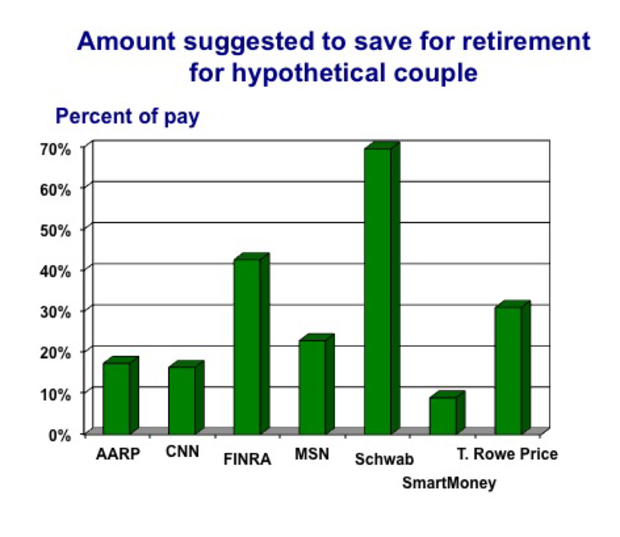Can you trust retirement calculators?
(MoneyWatch) Are you confused about how much you need to save for retirement? You're not alone -- many employees are perplexed by this task, as I reported in a recent post. And according to the 2012 Retirement Confidence Survey by the Employee Benefit Research Institute, less than half of all survey respondents try to calculate how much money they'll need to retire, and 42 percent of workers guess at this amount -- a particularly bad idea in my opinion.
I frequently recommend that people use an online retirement calculator to help them determine how much to save for retirement. To test my own advice, I decided to look at several, free retirement calculators that are readily available on the Internet to get a feel for the user experience.
The results of my review show why many people might end up confused by these tools. Some of the calculators aren't very user-friendly, and some ask for input on assumptions that only economists and actuaries can answer (and even they can only provide educated guesses at best). Most important, the amounts shown by the calculators as what you'd need to save for a secure retirement varied widely. With so much to cover on this topic, it will take a series of posts to report on the results of my review and to offer suggestions about how you can reduce the confusion.
For my review, I focused only on retirement calculators that estimate how much you should save and that are appropriate for people who are still years away from retirement. The calculations get more complex as you approach retirement, so I'll save this subject for a future post.
I started my review by doing an Internet search on the phrase "retirement calculator," and I only looked at calculators that turned up on the first page of my search that weren't in the special ad boxes. My review included the retirement calculators sponsored by these institutions: AARP, CNNMoney, the Financial Industry Regulatory Authority (FINRA), MSNMoney, Schwab, SmartMoney, and T. Rowe Price.
So I could consistently compare the results, I provided the same facts to each calculator:
- The hypothetical example is a married couple, both age 45.
- Each member of the couple earns $50,000 per year.
- Each also has $50,000 in retirement savings in their 401(k) plans.
- Each contributes 6 percent of their pay to their 401(k) plan and receives a 50 percent match from their employer.
The total annual 401(k) contribution this couple makes is $9,000 per year. Neither expects to receive a pension from their employer. They both want to retire at age 65, and they're targeting a retirement income of 85 percent of their pay just before retirement.
Each calculator asked additional questions about the couple's situation, so it was inevitable that the calculators would use different assumptions in some aspects. Whenever possible, I provided consistent answers to the additional questions. For example, if asked, I answered that this couple would need their retirement income for 30 years; in other words, I assumed that neither spouse would survive past age 95. If the calculator asked me to input a rate of return on my savings, I provided a rate of 6 percent per year; if prompted for the assumed rate of inflation, I provided a rate of 3 percent per year.
If a calculator didn't prompt me with a question for a specific assumption, I let the calculator use its default assumptions so I could best replicate a lay person's experience. This turned out to be one of the major reasons the results varied so much: The resulting recommendations on how much to save each year varied from a low of 9 percent of the couple's total annual pay to a high of almost 70 percent. Here's a summary of the results.
Worried about outliving your money? Americans aren't alone
5 big flaws of retirement calculators, and how to fix them
Stay tuned for my next posts on this topic that provide more in-depth reviews of the calculators and commentary on the results. I'll also discuss tips for using retirement calculators so you can develop a retirement strategy that works for you.

